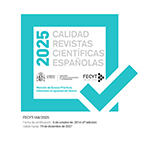'Business as usual': The Treaty of Lisbon and transnational party manifestos
Resumen
El Tratado de Lisboa supuso un auténtico hito en el proceso de fortalecimiento del Parlamento Europeo y de sus vínculos con la Comisión Europea. Esta última reforma de los Tratados, en vigor desde diciembre 2009, situó la única institución supranacional elegida directamente por todos los ciudadanos de la UE —desde 1979—, en pie de igualdad con el Consejo en tanto que colegisladora en alrededor de treinta nuevas áreas de políticas. El Tratado de Lisboa robusteció asimismo el Parlamento Europeo en las decisiones presupuestarias anuales y plurianuales, y le otorgó el derecho a elegir al presidente de la Comisión de acuerdo con los resultados de las elecciones europeas. El artículo examina algunos posibles efectos de este refuerzo del Parlamento Europeo y de su relación con la Comisión Europea en los programas de cinco partidos políticos a escala europea, que son la Alianza de los Liberales y Demócratas por Europa (ALDE), Alianza Libre Europea (ALE), Partido Verde Europeo (Verdes Europeos o PVE), Partido Popular Europeo (PPE) y Partido Socialista Europeo (PSE). Se estudió la variación a partir de 2004 en la extensión de las propuestas programáticas sobre los asuntos que son competencia de la UE, la eventual huella en sus programas de las propias organizaciones de partido a escala europea, así como de sus candidatos a presidir la Comisión Europea. Para ello, se llevó a cabo un análisis de contenido de los veinte programas presentados para las elecciones de 2004, 2009, 2014 y 2019 por parte de los partidos mencionados. Los resultados apuntan a la persistente distancia entre estos partidos transnacionales y las elecciones europeas, pese al impulso del papel del Parlamento Europeo a lo largo del tiempo.
Descargas
Descarga artículo
Licencia
La revista Política y Sociedad, para fomentar el intercambio global del conocimiento, facilita el acceso sin restricciones a sus contenidos desde el momento de su publicación en la presente edición electrónica, y por eso es una revista de acceso abierto. Los originales publicados en esta revista son propiedad de la Universidad Complutense de Madrid y es obligatorio citar su procedencia en cualquier reproducción total o parcial. Todos los contenidos se distribuyen bajo una licencia de uso y distribución Creative Commons Reconocimiento 4.0 (CC BY 4.0). Esta circunstancia ha de hacerse constar expresamente de esta forma cuando sea necesario. Puede consultar la versión informativa y el texto legal de la licencia.











